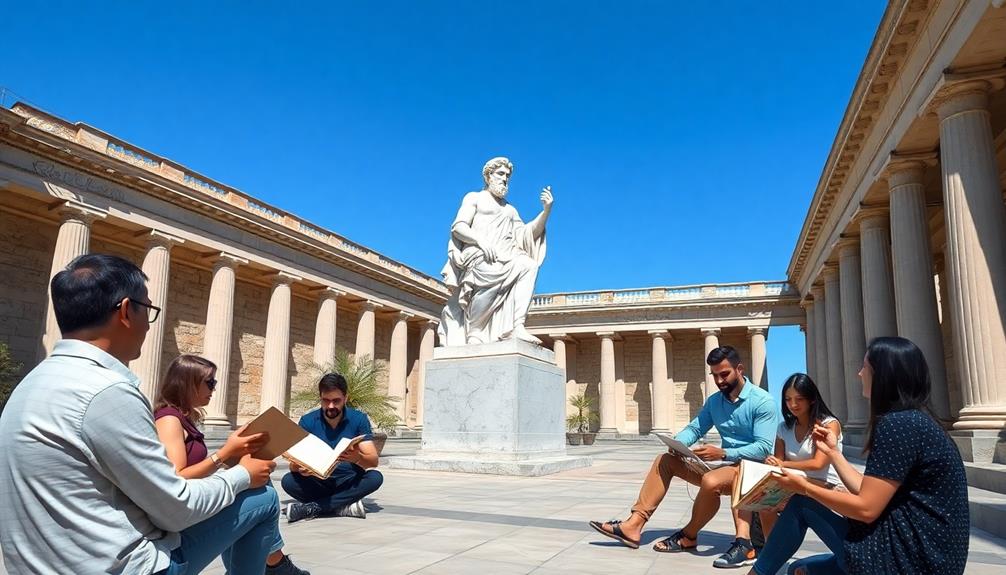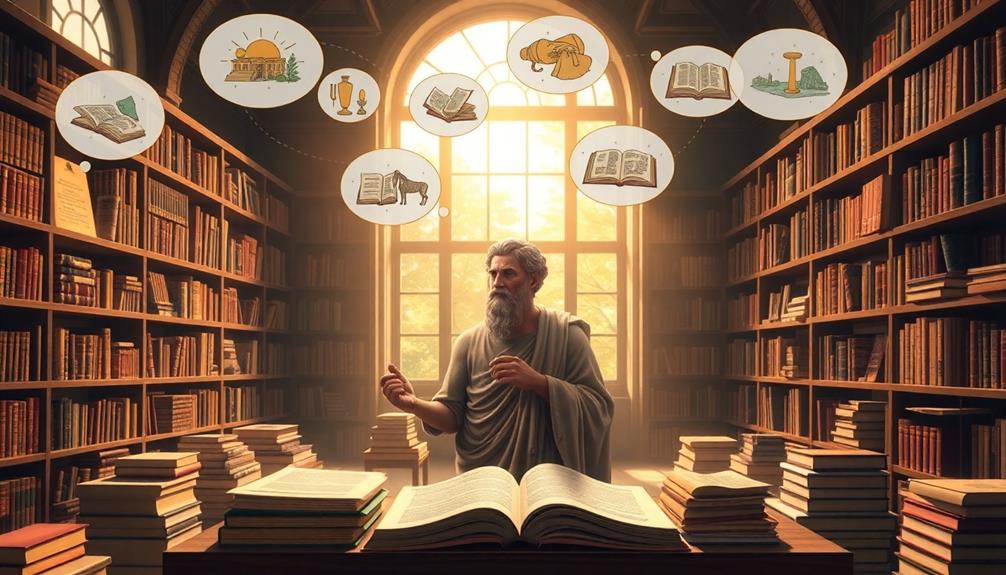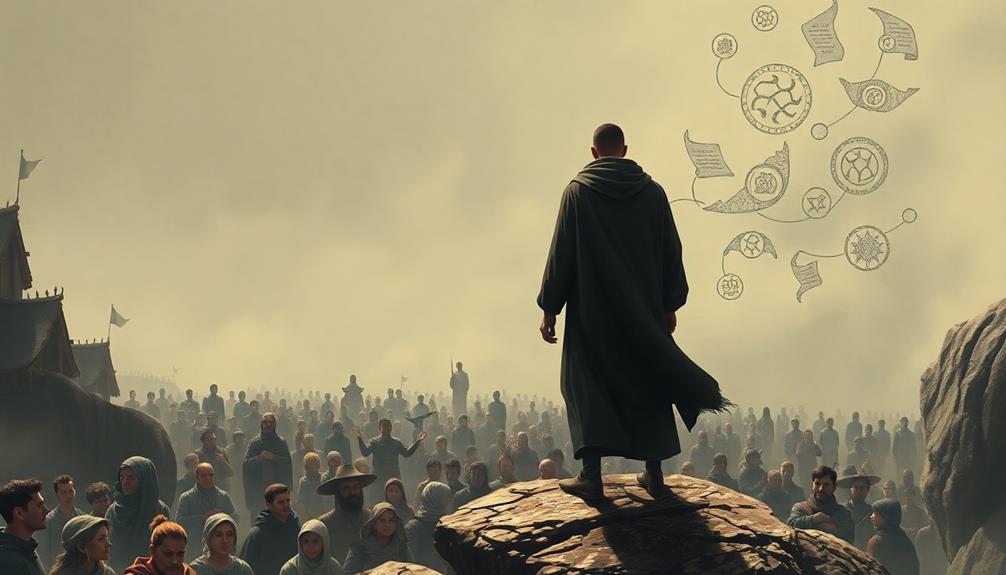If you're faced with modern dilemmas, think like Socrates. He'd encourage you to question your beliefs and motivations through self-reflection. By engaging in open dialogue, you'd gain clarity and recognize your biases. Socratic questioning would help you navigate ethical challenges, ensuring your decisions align with your values. Focus on truthfulness and integrity, which are essential for fostering trust and accountability in today's world. Embracing these principles can lead to personal growth and a deeper understanding of your choices. Curious about more practical applications of this wisdom? There's more to uncover that can truly guide you.
Key Takeaways
- Engage in Socratic questioning to critically examine personal beliefs and motivations behind modern dilemmas, fostering deeper understanding and self-reflection.
- Prioritize honest dialogue to cultivate trust and accountability in decision-making, aligning choices with personal values and ethical beliefs.
- Embrace self-reflection to uncover biases and align actions with true values, promoting internal harmony amidst competing desires.
- Utilize literature as a reflective tool to explore moral dilemmas and enhance self-awareness through characters' struggles and choices.
- Foster collective intelligence through collaboration, leveraging diverse perspectives to address complex social challenges effectively and creatively.
The Socratic Method Explained

While many educational methods focus on memorization, the Socratic Method stands out by emphasizing critical questioning to deepen understanding. This approach invites you to engage in Socratic dialogue, where the goal isn't just to win an argument but to collaboratively explore complex ideas. By asking a series of "why" questions, you challenge your own thought processes and reveal underlying assumptions that often go unexamined.
In this method, the emphasis is on dialogue over debate, fostering an environment where everyone can contribute their insights. As you navigate through discussions, you'll find that this questioning technique not only enhances your awareness of your reasoning and motivations but also promotes self-reflection.
The Socratic Method proves useful in various contexts, from classrooms to conflict resolution scenarios. By focusing on reasoning and evidence-based conclusions, it helps you tackle modern dilemmas and ethical discussions more effectively.
You'll discover that critical questioning can lead to innovative solutions and improved problem-solving, making it a powerful tool for both personal growth and collaborative learning. So, embrace the Socratic Method and reveal a deeper understanding of your beliefs and actions.
Self-Knowledge in Modern Life

To truly understand yourself in today's world, you need to embrace self-reflection.
By examining your beliefs and motivations, you can uncover cognitive biases that skew your perceptions and decisions.
Developing emotional intelligence can further enhance this process, allowing for deeper insights into your interactions and choices.
This journey not only fosters personal integrity but also aligns your actions with your core values, enhancing your sense of purpose.
Importance of Self-Reflection
Self-reflection is essential for traversing the complexities of modern life, as it allows you to uncover the motivations and beliefs that shape your actions. By engaging in self-reflection, you can ask yourself "why" repeatedly, a practice rooted in Socratic wisdom. This technique promotes greater self-awareness and helps you recognize biases that may cloud your judgment, especially in today's complex information landscape.
Socrates emphasized self-examination, encouraging you to confront the divided self highlighted by Plato. Unexamined desires can lead to internal conflicts, making it important to align your actions with your personal values.
Literature, like Tolstoy's "Anna Karenina," illustrates the pitfalls of self-deception, further underscoring the need for reflective practices.
Incorporating self-reflection into your daily routine fosters a coherent sense of identity and purpose. By questioning your beliefs and motivations, you can navigate personal and ethical dilemmas with clarity and confidence.
Ultimately, self-reflection not only enhances your decision-making processes but also enriches your understanding of yourself, making it a critical practice for anyone seeking to lead a meaningful life.
Overcoming Cognitive Biases
In the quest for self-knowledge, overcoming cognitive biases is essential for developing a clearer understanding of your thoughts and actions. Cognitive biases, like confirmation bias and the Dunning-Kruger effect, can distort your perception of reality and hinder your ability to grow.
Understanding how AI systems utilize algorithms to process data and make decisions can serve as a metaphor for our own need to analyze information critically. Socrates would approve of your efforts to self-examine and question your own beliefs, as this practice is vital for recognizing your limitations.
Engaging in self-inquiry, much like the Socratic method of asking "why," helps you identify and mitigate these biases. Through critical reflection, you can discern fact from fiction, especially in today's media-rich environment where misinformation is rampant.
Socrates emphasized the importance of open dialogue and questioning, fostering an atmosphere of personal accountability that encourages deeper understanding.
Cultivating Personal Integrity
Overcoming cognitive biases sets the stage for cultivating personal integrity, as it lays the groundwork for honest self-assessment. Socrates championed self-examination, reminding you that "the unexamined life is not worth living." By engaging in Socratic questioning—asking yourself "why" behind your choices—you can uncover the motivations driving your actions.
Understanding the divided self, as illustrated by Plato, is essential for aligning your actions with rational thought. This internal harmony fosters personal integrity. Literature, like Tolstoy's "Anna Karenina," showcases the struggles of characters facing self-deception, emphasizing the need for honest reflection.
Here's a simple way to visualize these concepts:
| Concept | Importance |
|---|---|
| Self-Examination | Understand beliefs & motives |
| Socratic Questioning | Enhance self-awareness |
| Alignment of Actions | Achieve personal integrity |
Aristotle reinforces that virtue is built through consistent practice. By cultivating good habits aligned with your values, you not only enhance your character but also pave the way for a more coherent identity. Embrace self-examination to foster integrity and navigate modern dilemmas effectively.
Truth and Integrity Today

In your daily life, embracing truthfulness can shape your character and influence those around you.
When making decisions, integrity is key; it helps you stay aligned with your values, even when faced with tough choices.
Embracing Truthfulness Daily
Every day presents countless opportunities to practice truthfulness and integrity, shaping not just your character but also the world around you. Socrates believed that the unexamined life isn't worth living, urging you to engage in self-examination regularly. By reflecting on your values and actions, you can align your decisions with your true beliefs.
You can harness the Socratic method by questioning your assumptions and seeking evidence-based conclusions in your daily interactions. This practice encourages open dialogue and honest conversations, fostering a culture of trust and accountability. When you commit to truthfulness, you not only enhance your integrity but also inspire those around you to do the same.
In moments of difficulty, remember Socrates' unwavering commitment to his principles, even in the face of death. Standing firm in your beliefs requires moral courage, especially when confronted with modern dilemmas.
Integrity in Decision-Making
Practicing truthfulness lays the groundwork for integrity in decision-making, a crucial aspect of steering through today's complex environment. Socrates emphasized the importance of integrity, famously stating that "the unexamined life isn't worth living." This idea encourages you to reflect on your values and decisions, ensuring they align with your ethical beliefs.
By adopting the Socratic method, you can question your assumptions and beliefs, fostering an atmosphere where honesty and transparency guide your choices.
When you prioritize integrity, you not only enhance your personal fulfillment but also fulfill your social responsibilities. Socrates' commitment to truth, even in the face of death, illustrates the profound impact of integrity in decision-making.
In contemporary contexts, integrity becomes essential in both personal and professional spheres. It helps you navigate dilemmas with a clear conscience, allowing you to make choices that resonate with your moral values.
Embracing this approach means standing firm in your principles, ensuring that your actions reflect your beliefs. In a world filled with ambiguity, let Socratic wisdom guide you to make decisions rooted in integrity, leading to a more authentic and responsible life.
Consequences of Dishonesty
Dishonesty can have far-reaching consequences that impact both personal relationships and broader societal structures. When you lie, you risk eroding trust—not just in your relationships but in society as a whole. With 70% of people believing lying is common, it's no surprise that dishonesty breeds cynicism and disconnection.
| Consequence | Personal Impact | Societal Impact |
|---|---|---|
| Breakdown of Trust | Strained relationships | Undermined social cohesion |
| Mental Health Issues | Increased anxiety and stress | Decreased public trust in institutions |
| Legal Repercussions | Harsher penalties in court | Erosion of legal integrity |
Moreover, organizations that tolerate dishonesty face high turnover rates, with 84% of employees willing to leave such environments. Dishonesty also creates a slippery slope, leading to further unethical behavior. Upholding truth and integrity not only enhances your relationships but also contributes positively to your mental health, as research shows that honest individuals report greater life satisfaction. By choosing honesty, you're investing in both your well-being and the fabric of society.
Navigating Inner Conflict

Inner conflict can feel like a battle raging within you, as competing desires and values vie for dominance. You might experience this struggle as a clash between your rational thoughts, emotional impulses, and instinctual cravings.
Socrates believed that true wisdom comes from self-awareness, and he advocated for a process of questioning that helps uncover your deeper motivations. By asking yourself "why" repeatedly, you can navigate these internal conflicts more effectively.
This idea mirrors Plato's concept of the divided self, where Reason, Spirit, and Appetite can lead to irrational decisions and inconsistent beliefs. Just like Freud's model of the ego, superego, and id, your inner turmoil reflects the ongoing struggle between instinctual desires and rational thought.
You may find yourself tempted by immediate gratification, similar to rubbernecking, where your curiosity conflicts with reasoned behavior.
To resolve these inner conflicts, embrace Socratic self-reflection. Engage in honest introspection to align your actions with your true values. By understanding the roots of your desires, you can make choices that reflect your authentic self, ultimately leading to a more harmonious existence.
Literature as a Reflection Tool

Literature invites you to confront characters' inner struggles, reflecting your own experiences and emotions.
As you explore themes of self-reflection, you can better understand your motivations and the choices you face.
This engagement not only enhances your critical thinking but also aligns with the Socratic method of questioning your beliefs and assumptions.
Characters' Inner Struggles
While exploring the depths of character dilemmas, you'll find that the emotional and psychological struggles depicted in literature serve as a powerful reflection of your own experiences. Characters often grapple with big questions about identity and morality, revealing their inner conflicts. Take, for example, Tolstoy's "Anna Karenina," where self-deception leads to tragic consequences.
Engaging with these narratives invites you to reflect on your own motivations and decisions. The Socratic method can be your guide, prompting you to ask "why" as you investigate a character's choices. This approach mirrors Plato's concept of the divided self, showcasing the tension between reason, spirit, and appetite.
| Character | Inner Conflict | Big Question |
|---|---|---|
| Anna Karenina | Self-deception vs. desire | Who am I when I betray my values? |
| Hamlet | Revenge vs. morality | Is it right to avenge a wrong? |
| Jay Gatsby | Love vs. aspiration | Can dreams truly lead to fulfillment? |
Themes of Self-Reflection
Characters' journeys often resonate with your own experiences, prompting deeper self-reflection. Literature acts as a mirror, revealing characters' struggles with self-perception and pushing you to examine your identities and beliefs.
Take "Anna Karenina," for example; it highlights the complexities of self-awareness and the consequences of self-deception. Engaging with these narratives can spark questions about your motivations and choices. As you explore these themes, consider how Abraham's Business Success Principles can enhance your professional growth and self-awareness.
The Socratic method emphasizes continually asking "why," which is essential for understanding your thoughts and actions. When you apply this method to literature, it becomes a powerful tool for introspection. As you explore a character's emotional turmoil, you may find parallels in your own life, leading to a more profound understanding of yourself.
Themes of self-deception in literature stress the importance of critical reflection. By recognizing your biases and assumptions, you pave the way for personal growth and improved decision-making.
Ultimately, literature fosters self-awareness, encouraging you to confront your truths and cultivate a coherent sense of identity and purpose. Embrace these stories as opportunities for self-examination, and you'll find that they illuminate paths to personal development.
The Power of Good Habits

Good habits hold the key to transforming your life in profound ways. When you consistently practice good habits, you can enhance your physical abilities and overall well-being. Your brain naturally follows learned pathways, making repeated actions more automatic over time.
Just as Aristotle emphasized, virtue is acquired through consistent practice; your actions shape your character and align with your values.
It's essential to recognize the dual nature of habit formation. Both positive and negative habits can be cultivated. By understanding this, you can improve your self-regulation and make choices that reflect your beliefs.
Engaging in self-reflection, perhaps through Socratic questioning, can clarify your motivations and help you make better decisions. This process ultimately leads to the development of good habits that foster a coherent sense of identity and purpose.
Critical Thinking in Education

Critical thinking is the cornerstone of effective education, transforming classrooms into vibrant spaces of inquiry. By employing the Socratic method, you can shift the focus from rote memorization to engaging dialogue and questioning. This approach encourages you and your peers to dive deeply into learning materials, fostering a culture of critical thinking that challenges assumptions and beliefs.
As you participate in Socratic questioning, you'll find that it empowers you to explore complex issues and develop your own viewpoints. This self-reflection and ethical reasoning are essential skills for maneuvering today's challenges.
Educational reform is increasingly necessary, as traditional models often stifle creativity and fail to prepare you for the cognitive demands of the 21st century.
Imagine incorporating collaborative platforms into your learning environment. These tools can enhance Socratic inquiry by connecting you with diverse perspectives and facilitating conversations across the globe.
Technology and Socratic Inquiry

Technology has revolutionized the landscape of education, creating dynamic learning environments where Socratic inquiry can thrive. As you engage with tools like video conferencing and collaborative platforms, you can practice the Socratic method, which emphasizes questioning and dialogue. This approach not only enhances critical thinking but also enables you to connect with diverse perspectives, breaking down barriers associated with social class.
In this digital age, you can emulate Socrates by exploring ethical dilemmas posed by emerging technologies. As a young man or a student, you can critically reflect on societal norms and the implications of technological advancements through guided discussions with your professor of philosophy. By leveraging these digital platforms, you'll find opportunities to apply knowledge in real-world contexts, preparing you to tackle complex challenges collaboratively.
Moreover, the creation of virtual libraries and organized inquiry platforms echoes Socratic traditions, promoting collective knowledge generation. Embrace these tools, and you'll enrich your understanding, allowing the spirit of Socratic inquiry to flourish in a modern educational landscape.
This way, you can't only learn but also contribute to meaningful dialogues that shape your understanding of the world.
Collective Intelligence and Collaboration

In an age where collaboration is more accessible than ever, harnessing collective intelligence can transform how we approach problem-solving and innovation. By leveraging the shared knowledge and problem-solving abilities of diverse groups, you can tackle complex challenges more effectively.
| Aspect | Impact | Example |
|---|---|---|
| Communication | Seamless sharing of ideas | Online brainstorming sessions |
| Diverse Perspectives | Enhanced creativity and innovation | Cross-disciplinary teams |
| Community Engagement | Balanced insights and solutions | Local initiatives addressing climate change |
Digital platforms play an essential role in this process, enabling individuals to communicate and collaborate effortlessly. When you engage with a broader range of stakeholders, you tap into a wealth of insights that enrich your understanding. Research shows that collective intelligence leads to more effective solutions for pressing global issues, such as public health crises.
Applying Wisdom to Current Issues

Wisdom serves as a guiding light in today's complex landscape, where ethical dilemmas and societal challenges often feel overwhelming. When confronting issues like healthcare ethics, Socrates would say you should engage in Socratic questioning. This method encourages you to critically examine your beliefs, helping you navigate the murky waters of decision-making.
Instead of simply debating contentious topics such as freedom of speech or social justice, promoting dialogue fosters understanding and collaboration. Socrates' unwavering commitment to truth and integrity inspires you to prioritize ethical considerations, especially when societal pressures tempt you to compromise your values.
By practicing self-reflection, you can identify personal biases and cultivate a more informed perspective on current events. This process not only sharpens your judgment but also enriches your discussions with others.
Moreover, the emphasis on moral accountability in Socratic philosophy serves as an essential reminder. Socrates would say that both individuals and organizations must act in accordance with their values, especially when addressing pressing social and environmental challenges.
Frequently Asked Questions
What Was Socrates Impact on Modern Society?
Socrates profoundly shaped modern society by promoting critical thinking, ethical principles, and self-examination. His methods encourage you to engage in dialogue, question assumptions, and appreciate diverse perspectives, fostering a deeper understanding of complex societal issues.
What Is the Dilemma of Socrates?
Imagine standing at a crossroads, where truth glimmers like a distant star. Socrates faced the dilemma of choosing between unwavering principles and societal pressures, ultimately sacrificing his life for his steadfast commitment to integrity and wisdom.
What Is an Example of Socrates Wisdom?
Socrates' wisdom shines through his belief in questioning everything. When you challenge your assumptions and seek true knowledge, you foster growth. Embrace humility and let your quest for understanding guide your decisions and actions.
What Did Socrates Believe on All Knowledge and How That Is Applied to Learning in Students?
Did you know that students retain 80% of what they actively engage with? Socrates believed knowledge stems from questioning and dialogue, urging you to explore your beliefs and recognize your ignorance as a pathway to learning.
Conclusion
In a world buzzing with noise, embracing Socratic wisdom can light your path through modern dilemmas. By fostering self-knowledge and nurturing integrity, you can steer clear of life's murky waters. Reflecting on literature and honing critical thinking will empower you to navigate the complexities of technology and collaboration. Ultimately, as you apply Socrates' timeless insights to today's challenges, you'll find that wisdom might just be the compass guiding you toward a clearer, more meaningful existence.









